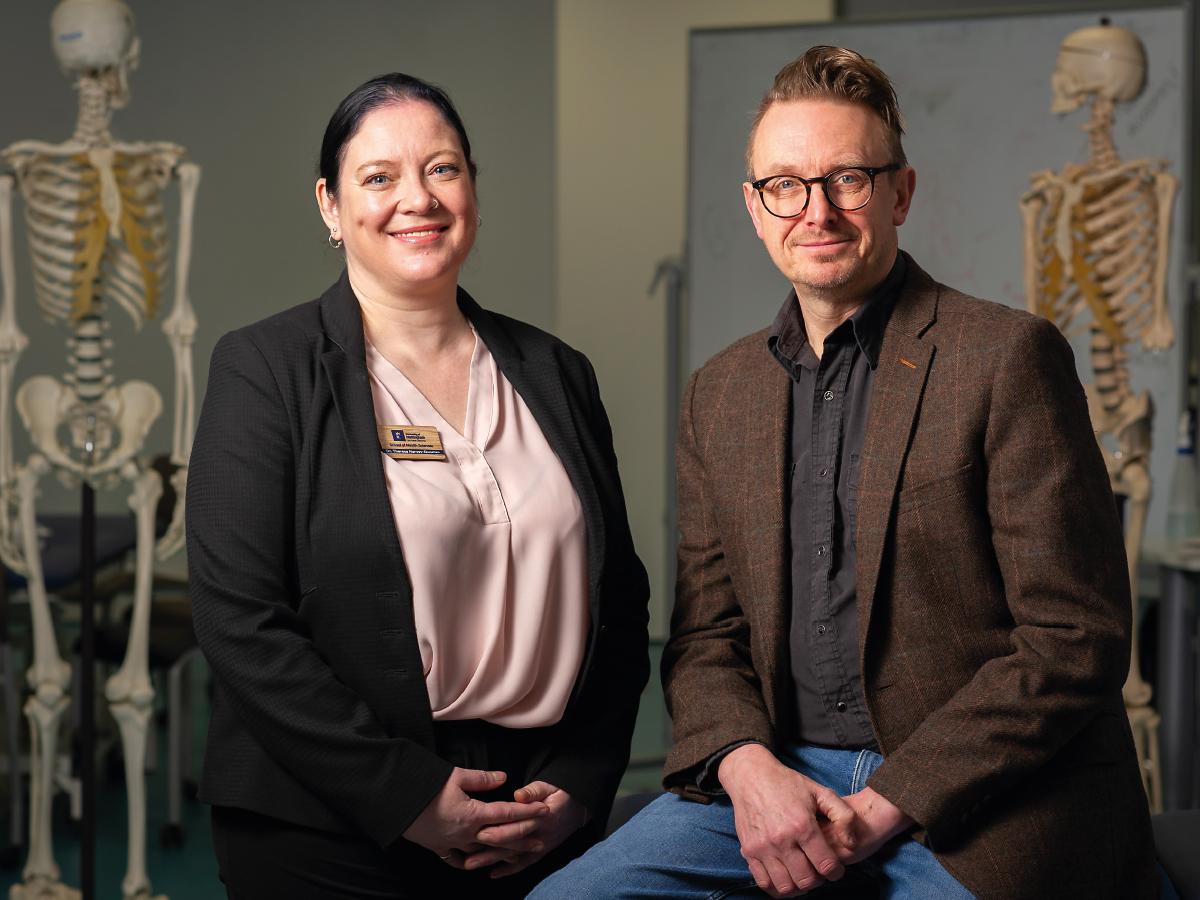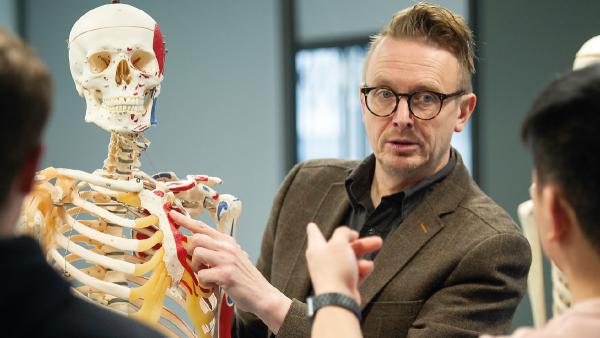An innovative university has developed a new contemporary curriculum that aims to equip physiotherapists with the skills they need to work in changing and challenging healthcare systems, as Mark Gould reports

Physiotherapy education is undergoing a seismic change, which will hopefully produce a new generation of confident, highly skilled practitioners who can meet the healthcare demands of a rapidly changing world.
Students embarking on the ‘trailblazing’ pre-registration physiotherapy programme at the University of Nottingham in September will be faced with a new curriculum with modules that centre around key, generic aspects of the profession such as population health, leadership, human functioning and rehabilitation. These will be brought to life through a series of case studies and simulation-based learning, designed to enhance critical thinking and boost person-centred reasoning skills.
Fundamental review
The re-design has been led by assistant professor of physiotherapy Dr Theresa Harvey-Dunstan, and professor of physiotherapy education Dr Roger Kerry, from the University’s School of Health Sciences.
Theresa says that the fact that the course was due for Health and Care Professions Council (HCPC) revalidation and CSP re-accreditation this year presented a time for re-evaluation in the context of faculty and school strategy aims around areas including engagement diversity and inclusion (EDI), learning from Covid, and from national student surveys.
They also drew on the innovative KNOWBEST report, commissioned by the CSP and completed by the University of Hertfordshire, which sets out a series of recommendations regarding the knowledge, skills, behaviours and attributes required of the modern physiotherapy graduate.*
Engaging partners
Theresa said that conversations around changing the course started in December 2021.
‘We asked whether the course was delivering the physiotherapy students and future professionals that meet the changing needs of local, national and international populations and the challenging times that we are living through. We decided that the current curriculum doesn’t meet those needs as they have changed so much.’
She adds that the consultation process was extensive, and guided by input from as many stakeholders as possible.
‘We have had student input through several consultation events, we also invited our clinical practice partners, NHS acute and community providers, private providers, elite athletic and sporting providers, research experts, service users, senior management, the infrastructure within the University – such as equality diversity and inclusion, alumni and academic partners.’
A ‘bigger picture’ curriculum
Roger, who will be leading the new course, says that what became apparent from the consultation, Covid aside, is that the world of healthcare is quite different to what it was two decades ago.
‘The World Health Organization and the United Nations agree that things are changing more unpredictably and more rapidly than ever. There are more complex health needs, more wars, more diseases, strains on systems, financial uncertainty, different health needs of people, different working practices.’
Importantly, Roger says healthcare professionals need to look at the bigger picture when they see a patient.
‘At one time we might have thought prodding someone’s back or rubbing their muscles was enough. Now we can see the bigger picture is about getting people engaged and back in society in a sustainable way. We need to look at what our skill set is as physiotherapists to address that bigger picture.’
With a wealth of consultation information on board Roger says they decided to change all the modules of the programme.
‘Typically, physiotherapy would teach anatomy, physiology, musculoskeletal etc. or interventions such as exercise or manual therapy.
We flipped that on its head and said let’s deliver our course in generic transferable things like health evaluation, rehabilitation, leadership, thinking critically, and understanding human movement at a broader level.’

Problem-based learning
The new course focuses on a series of case studies, being designed now, where the backstory of the patient, the bigger picture of their life, family and psycho-social issues are gradually revealed, leading to new challenges and new learning for students.
‘We might have a case study of somebody with low back pain, but we want to use that as an opportunity to talk about inclusivity and mental health. If the person has had pain for three years that will have had an effect on employment or mental health. The case studies start relatively simply, but they progress and grow in complexity as the students follow them through the course.
‘It’s juicy stuff and a world away from ‘here’s a footballer with a sprained ankle – show us how to put tape on it’. Everything is anchored to these case studies, and they develop really broad higher-level thinking attributes as the course goes on. They bridge that gap between university and the real world of clinical practice.’
Theresa says the university is keen on applying the model to other programmes. Attractions include reduced staff burden, as teaching time will be more efficient, the reduced assessment burden for staff and students, at approximately the same cost as the old course.
The university has invested in equipment and clinical skills structures including building stimulation suites, virtual reality and immersive learning – all of which Theresa says chime with the problem-based learning theory, which is all part of the KNOWBEST ethos.
Some 75 students will start in September and Theresa and Roger stress they want to keep numbers low ‘so we can produce the highest calibre physiotherapists of the future’.
And Roger says news of their work is spreading. ‘In the context of the world of physiotherapy there have been a lot of comments from people in the UK and internationally, in Canada, New Zealand, saying “oh this looks interesting”. People are watching with excitement to see what happens.’
CSP’s role in physio education
The CSP accreditation and reaccreditation processes play an important role in the quality assurance and enhancement of physio education throughout the UK.
The development of a new or revised physiotherapy programme is a lengthy and considered process for university teams. The CSP education team work together with CSP educational representatives – who have a breadth of experience in the planning and delivery of physiotherapy education – to help support, challenge and drive the many aspects that contribute to the quality of programmes.
The University of Nottingham’s approach to re-accreditation is to be commended, says CSP education adviser Tamsin Baird:
‘They’ve moved their curriculum from being subject to person specific, transforming their course to meet the changing demands of the people and populations in the UK. This is fantastic to see.
‘Our profession is evolving and, as such, the required skill set of this and the next generation of physiotherapists is too. Embedding societal health, leadership, population health and criticality across the programme takes big steps to develop a future workforce to better deal with the complexities in practice once they qualify.’
This includes curriculum design, methods of teaching, placement structure and opportunities, types and choice of assessments, multi-professional learning, admissions processes, support structures for staff and students, physical buildings and facilities, and the diversity of both students and the programme team amongst many others. Consideration is made to how themes – such as digital or person-centred reasoning – are integrated throughout a programme and how the voices of students, practice and service users are both captured and incorporated.
The CSP’s approach addresses all of these aspects to ensure that physiotherapy education is quality assured and the needs of the future workforce to practice in modern healthcare systems are integrated.
Andy Schofield, course leader for the physiotherapy degree apprenticeship at the University of Huddersfield, is the CSP education rep for the University of Nottingham.
He says: ‘It is refreshing to have observed such an innovative approach to a physiotherapy curriculum that, through simulated practice and a clear interprofessional approach, will ensure the student will develop a holistic approach to the complexities presented through the management of service users.
‘The course could well serve as a future reference point for new courses or those wishing to re-accredit. We’d also commend the fantastic support that is provided by the senior management team at the University of Nottingham to enable the programme team to have been creative in their approach.’
KNOWBEST
The KNOWledge, BEhaviours and Skills required of the modern physioTherapy graduate including the future role of practice-based learning.
‘The demand for physiotherapy is growing and the future workforce needs to have the knowledge, skills and behaviours required for delivering effective health and social care over the next 50 years and beyond,’ the CSP said when inviting tenders for the KNOWBEST project.
The CSP commissioned the report to gather information about how education is changing and set out the educational requirements of a new generation of physiotherapists dealing with an ageing population with multiple morbidities.
*A new CSP publication, ‘Principles of Practice Based Learning’, sets standards for PBL.
Number of subscribers: 2




































